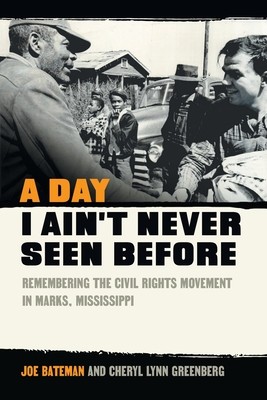
- We will send in 10–14 business days.
- Author: Cheryl Lynn Greenberg
- Publisher: University of Georgia Press
- ISBN-10: 0820363049
- ISBN-13: 9780820363042
- Format: 15.2 x 22.9 x 2 cm, softcover
- Language: English
- SAVE -10% with code: EXTRA
Reviews
Description
The Black people of Marks, Mississippi, and other rural southern towns were the backbone of the civil rights movement, yet their stories have too rarely been celebrated and are, for the most part, forgotten. Part memoir, part oral history, and part historical study, A Day I Ain't Never Seen Before tells the story of the struggle for equality and dignity through the words of these largely unknown men and women and the civil rights workers who joined them. Deeply rooted in documentary and archival sources, this book also offers extensive suggestions for further readings on both Marks and the civil rights movement.
Set carefully within its broader historical context, the narrative begins with the founding of the town and the oppressive conditions under which Black people lived and traces their persistent efforts to win the rights and justice they deserved. In their own words, Marks residents describe their lives before, during, and after the activist years of the civil rights movement, bolstered by the voices of those like Joe Bateman who arrived in the mid-1960s to help. Voter registration projects, white violence, sit-ins, arrests, school desegregation cases, community-organizing meetings, protest marches, Freedom Schools, door-to-door organizing--all of these played out in Marks. The broader civil rights movement intersects many of these local efforts, from Freedom Summer to the War on Poverty, from the death of a Marks man on the March against Fear (Martin Luther King Jr. preached at his funeral) to the Poor People's Movement, whose Mule Train began in Marks. At each point Bateman and local activists detail how they understood what they were doing and how each protest action played out. The final chapters examine Marks in the aftermath of the movement, with residents reflecting on the changes (or lack thereof ) they have seen. Here are triumphs and beatings, courage and infighting, surveillance and--sometimes-- lasting progress, in the words of those who lived it.EXTRA 10 % discount with code: EXTRA
The promotion ends in 19d.06:33:45
The discount code is valid when purchasing from 10 €. Discounts do not stack.
- Author: Cheryl Lynn Greenberg
- Publisher: University of Georgia Press
- ISBN-10: 0820363049
- ISBN-13: 9780820363042
- Format: 15.2 x 22.9 x 2 cm, softcover
- Language: English English
The Black people of Marks, Mississippi, and other rural southern towns were the backbone of the civil rights movement, yet their stories have too rarely been celebrated and are, for the most part, forgotten. Part memoir, part oral history, and part historical study, A Day I Ain't Never Seen Before tells the story of the struggle for equality and dignity through the words of these largely unknown men and women and the civil rights workers who joined them. Deeply rooted in documentary and archival sources, this book also offers extensive suggestions for further readings on both Marks and the civil rights movement.
Set carefully within its broader historical context, the narrative begins with the founding of the town and the oppressive conditions under which Black people lived and traces their persistent efforts to win the rights and justice they deserved. In their own words, Marks residents describe their lives before, during, and after the activist years of the civil rights movement, bolstered by the voices of those like Joe Bateman who arrived in the mid-1960s to help. Voter registration projects, white violence, sit-ins, arrests, school desegregation cases, community-organizing meetings, protest marches, Freedom Schools, door-to-door organizing--all of these played out in Marks. The broader civil rights movement intersects many of these local efforts, from Freedom Summer to the War on Poverty, from the death of a Marks man on the March against Fear (Martin Luther King Jr. preached at his funeral) to the Poor People's Movement, whose Mule Train began in Marks. At each point Bateman and local activists detail how they understood what they were doing and how each protest action played out. The final chapters examine Marks in the aftermath of the movement, with residents reflecting on the changes (or lack thereof ) they have seen. Here are triumphs and beatings, courage and infighting, surveillance and--sometimes-- lasting progress, in the words of those who lived it.

Reviews